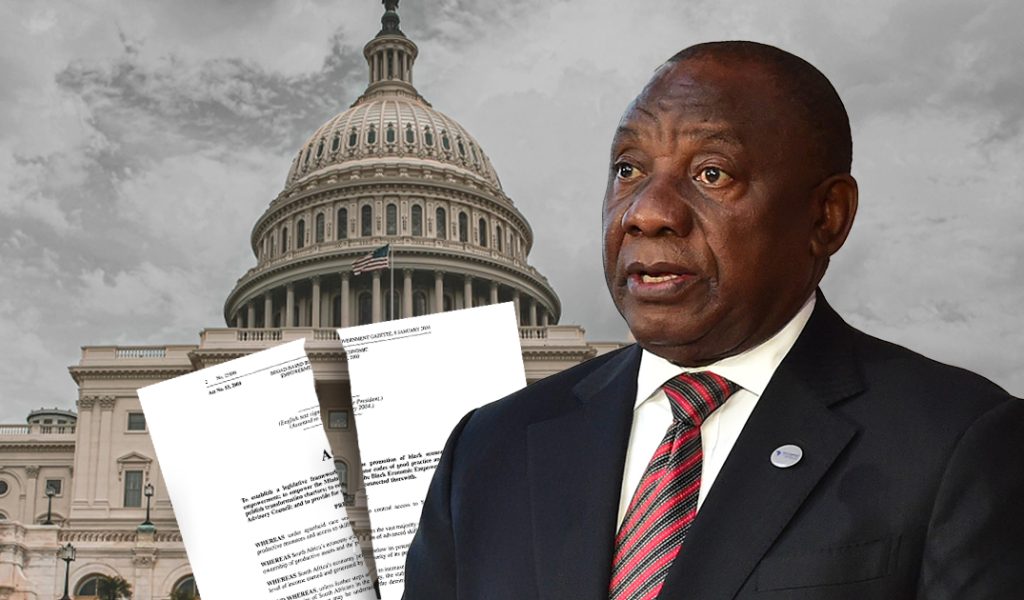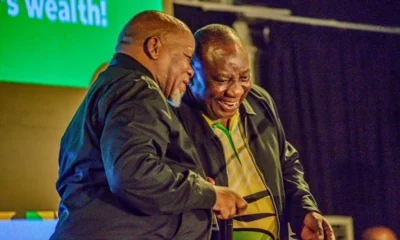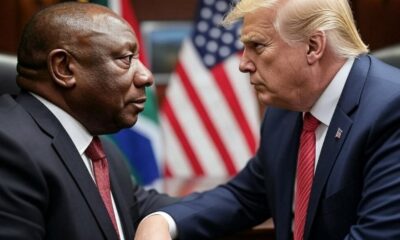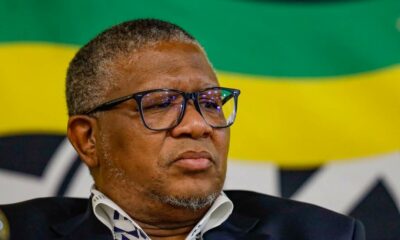News
Washington vs BEE: US Pressures South Africa to Drop Empowerment Rules for American Firms

A fresh diplomatic storm may be brewing between South Africa and the United States, after Freedom Front Plus (FF Plus) leader Corné Mulder returned from Washington with a controversial message: US companies want out of Black Economic Empowerment (BEE).
According to Mulder, the Trump administration has made it clear that it expects American businesses in South Africa to be exempt from all BEE requirements, a demand reportedly tied to broader US conditions for normalising relations with Pretoria.
Mulder briefed the media following his party’s recent trip to the US, where FF Plus met with senior White House officials. But he has yet to brief President Cyril Ramaphosa, raising questions about the political weight and legitimacy of his delegation’s discussions.
Trade or Tension?
There are over 600 US companies operating in South Africa, many of which are subject to BEE compliance regulations. These include ownership, procurement, and employment equity measures aimed at redressing the legacy of apartheid and creating inclusive economic growth.
But according to Mulder, the US administration views BEE as a “non-tariff trade barrier” and has made it a sticking point in any move to mend fractured trade ties, particularly following South Africa’s controversial move at the International Court of Justice (ICJ) to accuse Israel of genocide.
The demands don’t stop at BEE: US officials reportedly also want Pretoria to take a firm stance against farm attacks, public incitement like the “Kill the Boer” chant, and to ensure fair market compensation in land expropriation cases.
“We Heard You on BEE”
Southern African Agri Initiative chairperson Theo de Jager, part of the FF Plus delegation, said US officials were firm: no trade reset without policy reform.
“They said they had heard us on the BEE matter… and they would not restore any trade relationship if these preconditions are not adhered to,” De Jager revealed.
He warned that policies like BEE and expropriation without compensation have created a climate of investment risk. “We are gradually losing investment. You cannot invest in a country where you are not safe,” he added.
DIRCO and the Presidency: Not Impressed
South Africa’s Department of International Relations and Cooperation (DIRCO) quickly distanced itself from the FF Plus trip, saying “non-state actors” like political parties do not speak for government in diplomatic engagements.
“This is their own agenda,” said DIRCO spokesperson Chrispin Phiri. “State actors do not use intermediaries.”
The Presidency remained tight-lipped, with spokesperson Vincent Magwenya declining to comment on how Ramaphosa’s government would respond.
However, Ramaphosa has been unapologetic in his public stance on BEE, calling it essential to redressing structural inequality in South Africa’s economy.
“BEE is not holding back the economy. The concentrated nature of our economy is,” the president said recently, adding that the use of racial classifications may one day be phased out, but that day hasn’t come yet.
Business Sector Voices Alarm
Not all South African business leaders are dismissing the FF Plus’ claims. Piet le Roux, CEO of business lobby group Sakeliga, said this marks a “substantial escalation” of global resistance to what he called “race-restrictive policies.”
“This isn’t just a domestic debate anymore. International partners are pushing back and hard,” said Le Roux, warning of increased multilateral and bilateral pressure in the months ahead.
The Bigger Picture: Sovereignty vs Survival
At its core, this conflict reflects a deeper philosophical and political tension: South Africa’s right to design redress policies for its unique history versus the expectations of powerful global partners whose investments are tied to different principles.
Political analyst John Molepo warned that the situation could spiral into a full-blown diplomatic escalation, with potential US sanctions or WTO-level disputes on the cards if South Africa refuses to bend.
“The Americans are framing this as a trade and investment issue,” he said. “But for South Africa, BEE is about economic justice. It’s not an easy compromise.”
What Comes Next?
Mulder’s trip and his subsequent briefing may not carry diplomatic authority, but it puts pressure on Ramaphosa’s administration to clarify its stance as global scrutiny intensifies.
Whether the Trump administration’s demands are formal US policy or political posturing remains to be seen, but the conversation they’ve ignited is real and uncomfortable.
In a country battling record-high unemployment, stalling growth, and a fragile social contract, how South Africa balances its moral commitments with economic pragmatism may define its foreign policy for years to come.
{Source: IOL}
Follow Joburg ETC on Facebook, Twitter , TikTok and Instagram
For more News in Johannesburg, visit joburgetc.com



























